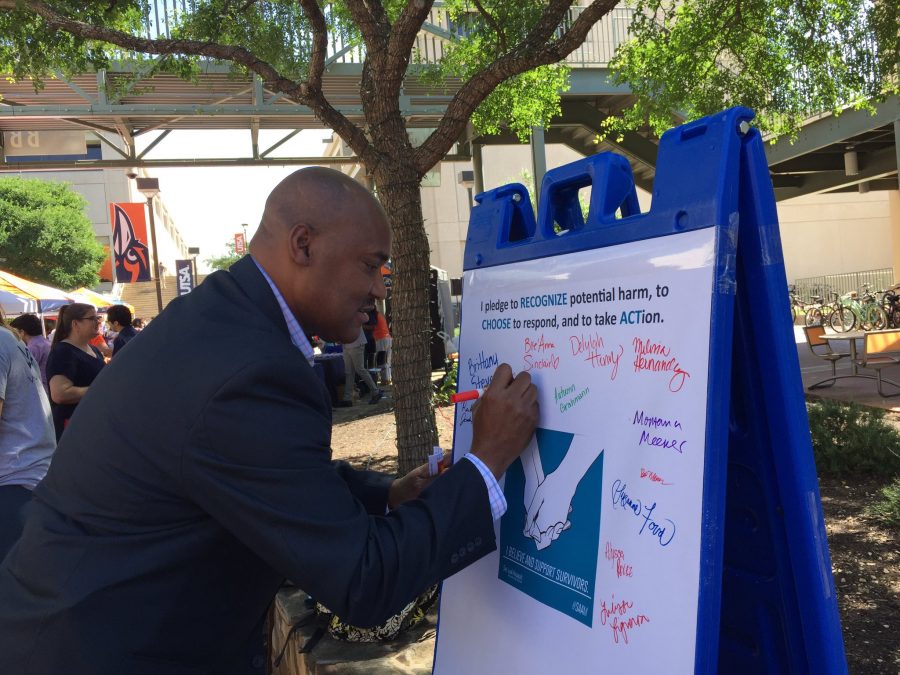A non-specific bomb threat, targeting the John Peace Library, left many UTSA students confused and concerned last Monday and Tuesday when they were instructed to evacuate the building. Among the officers on the scene was Associate Vice President of Public Safety and Chief of Police Gerald Lewis, Jr.
The night of the first bomb threat, two students approached Lewis with questions about the potential threat. Sporting Adidas track pants and a t-shirt, Lewis assured the students with good natured seriousness, making yet another connection with students who he fondly refers to as his own children.
“I think communication is a huge tool for me. You’ll see if I am walking around campus, I sit down and I talk to students,” Lewis said. “I saw a young lady on the elevator the other day, and I started talking to her, because it was funny. Her friend was running for the elevator and she closed the door before her friend got there, and I said, ‘That was cold.’”
Lewis uses these interactions with students to foster communication and trust between students and the UTSAPD.
“We don’t ever want people to be afraid to come to us. If something happens, we want people to come and let us know about it,” Lewis said. “When UTSA police come to the scene, I want people to say, ‘Hey, things are about to get better.’”
Lewis, himself, has two daughters who recently graduated from college. He gives them partial credit for his ability to relate to students. He explained he can ask them questions such as what “shots fired” means and receive a sincere response.
“Of course, me being old school, I said, ‘Shots fired? We better call the emergency people,’ and my daughter said, ‘No, dad, that’s not what it means. Shots fired means someone threw shade at you.’”
Another new concept Lewis has learned is “Spurs love.” Lewis told The Paisano, “I also realized that you have to love the Spurs. I made the mistake in a town hall meeting of mentioning another team, and oh man, they’re looking at me like, ‘I can’t believe he just said that.’ They were not happy I mentioned another team, so now I have a Spurs jersey. I just laughed and said, ‘I can’t believe I made that mistake.’”
As Associate Vice President of Public Safety and Chief of Police, Lewis leads over 50 sworn officers and 90 civilian employees in issues related to the police department, environmental health safety and risk management (lab safety, chemical disposal, etc.) and emergency management.
Lewis is always trying to help educate young people, but he’s also running a law enforcement agency. He wears many hats at UTSA and identifies as an administrator more so than an educator.
Shortly after speaking with the two students about the bomb threat, he confirmed to The Paisano that the UTSAPD and SAPD had evacuated, searched and repopulated the building. Never truly off-duty, Lewis was compelled to be on site during the potential emergency.
“As a police chief, you have to be a light sleeper,” Lewis said.
At 54, Lewis is 6’ 4” tall with good posture. Sporting a suit, a tie and a well trimmed mustache Lewis is authoritative with the well-measured pace of a professor (Lewis was an adjunct professor for five years at Fairleigh Dickinson University). His familiar anecdotes exemplify an administrator who’s in touch with his community, particularly the youth. Lewis may not have been at UTSA long, but he has the candor of a man at home.
Lewis assumed his role at UTSA nearly a year ago and fostered relationships not only with students but also with community organizations. He has met with The Paisano, Student Government Association, UTSA NAACP, Muslim Student Association, Spectrum and other student organizations.
“I think some of them are surprised when I call for a meeting,” Lewis said. “They ask why I’m calling, and I explain that I just want to come and meet with them; I want to get to know them. I just don’t want to meet these groups during crisis. I want a relationship prior to that.”
Vice President of the UTSA NAACP Jessica Reyes recounted her chapter’s meeting with Lewis. Reyes said he was very personable and showed an interest in helping their organization.
“Chief Lewis knew how to relate to everyone’s concerns and thoughts about situations going on locally and nationally,” Reyes said. “He left our members feeling like we had someone on campus that understood us.”
Accountability is an attribute the NAACP chapter hopes the police department will have. The chapter organized a silent protest in October to call attention to disproportionate police violence against African Americans.
“I remember seeing a post on Twitter saying, ‘It would’ve been nice if the police department was involved,’” Lewis recalled. “And I said, ‘Did you see a guy standing there in a grey suit? That was the police chief.’”
During college in the early ‘80s, Lewis described himself as a kid who was a little different. He “danced to the beat of his own drum” and didn’t fit into a particular label.
“I was wearing ripped jeans in 1981, way before it was cool. Back then, people just laughed at me for wearing them,” Lewis said.
Lewis stood out, but his experiences outside “the norm” during his youth prepared him to be sensitive to UTSA students who may not feel like they fit in.
After graduating from the 109th New Jersey State Police Training Class in Nov. 1987, Lewis built a career based on the principles of communication.
Before Lewis was a university police chief, he was the highest ranking black trooper in New Jersey when he retired 2013. He has 29 years of law enforcement experience.
At the New Jersey State Police Department, he attained the rank of major and served as the Office of Community Affairs Commanding Officer. He previously served as the Director of Communications for the department.
“My job was to be a liaison between any community we served and the state police,” Lewis said. “It gave me the preparation to be a university police chief and dealing with people in general. The experience made me sensitive to different communities; it made me understand different communities, and I think it made me more well-rounded.”
Lewis’ work included a partnership with the NAACP, clergy and community leaders to ensure qualified minority candidates were recruited to become New Jersey State Troopers. The partnership resulted in the two most diverse classes in state police history.
“Working with different groups was eye opening also because it wasn’t always friendly,” Lewis said. “Sometimes we would have to meet, and we would almost have to agree to disagree, but we would have to come to a conclusion that was best for everyone, and most of the time we were able to do that.”
Lewis’ work resulted in close ties to high ranking government officials, including New Jersey Governor Chris Christie. A community service award from the Southern Burlington County Branch of the NAACP was named in Lewis’ honor.
Lewis was born in Newark, New Jersey, but his family’s original connection to the South made him want to return. As Chief of Police of the East Carolina University Police Department, Lewis gained university policing experience before “the once in a lifetime opportunity” with UTSA.
Lewis said he was interested in UTSA’s relatively young status and saw it as an opportunity to grow as the university expanded.
“The University of Texas at San Antonio is one of the safest universities in the country—not just in Texas, but in the country. We will continue to work towards safety,” Lewis said. “We never stop working towards safety; we will continue to come up with innovative programs. We will continue to train diligently. We want to be the safest campus in the country. That is our goal.”
The UTSA Police Department has a new initiative coming to campus under Lewis’ leadership. The Rowdy Watch Student Patrol, consisting of trained students employed through the work study program, will serve as extra eyes and ears for the UTSAPD. The students will be equipped with a shirt, a walkie-talkie and a flashlight. Their focus area will include the JPL and residential areas. The Student Patrol will check blue light phones and be an escort for students who would like one.
“I think they’re going to be a great complement to the police department. It also gives our students, as stakeholders, the opportunity to invest in our safety campuswide.”
Lewis and his team are developing the Rowdy Watch Student Patrol and have met with student organizations, such as the SGA for feedback. As Lewis wraps up his first full year at UTSA, he looks forward to a summer in San Antonio with his wife and 12-year-old son.
“The adjustment for my family”









